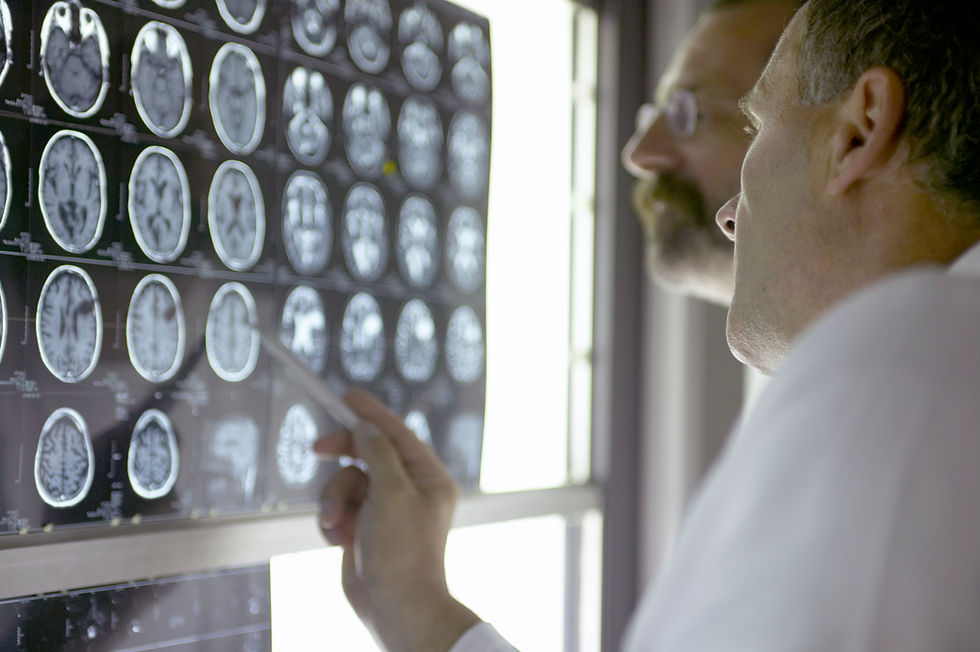記憶紊亂者的音樂之助 A Remedy for Memory Impairment
- music therapy taptalk

- Sep 24, 2023
- 4 min read
Updated: Oct 22, 2023
文/Zoe
Scroll down to read in English 👇

記憶紊亂的表象為記憶能力減弱(例如:對日期、名字等事物的記憶減弱),並伴隨著增加的健忘現象(例如:忘記為什麼要出門)。(出自:美國國立衛生研究院,原文如下)
An impairment of memory as manifested by a reduced ability to remember things such as dates and names, and increased forgetfulness. (NIH)音樂時常在生活中成為幫助我們記憶的媒材
除了提升學習效率以外,也提升個案學習和練習的意願和趣味性。
常見的音樂應用於記憶的日常例子:
英文單字歌abc,旋律幫助我們記得字母順序
九九乘法表,利用節奏幫助學生記住數學概念
身體部位歌曲,旋律幫助孩童們認識身體
音樂治療可以如何幫助記憶紊亂
簡單來說,音樂元素為音樂治療師可操弄的媒材, 透過與目標事物或文字結合, 配合個案的治療進程,利用音樂的時間特性、感官刺激加強個案對人事物的記憶, 減少個案混亂的機率。
生活運用
決定要記住的內容
例如:一天的行程、週期元素表、生活規矩、概念等。 同一首歌維持同一概念,較不易混亂
音樂的選擇
若沒有音樂背景,可以選擇熟悉的歌曲下手, 例如:兒歌。
歌詞怎麼寫?
根據原曲的字數替換相同的字數,並使用符合個案認知能力的字詞。(若音樂能力許可,可變換字數稍微改變節奏。)
歌詞改寫:以小星星為例
小星星的前兩句歌詞為:一閃一閃亮晶晶 滿天都是小星星
提醒行程可改寫成 ➜ 9點起床刷牙去 10點出門看醫生...
生活常規可改寫成 ➜ 講話之前要舉手 上廁所前要舉手...
練習概念可改寫成 ➜ 紅色蘋果和草莓 綠色芭樂和酪梨...
了解環境可改寫成 ➜ 白色牆上有幅畫 綠色床單和枕頭...等等。
音樂的目的
音樂除了剛剛提到的音樂的時間特性和感官刺激以外, 記憶紊亂者時常會因為面對不明狀況時常引發焦慮(Lukasik et al., 2019), 通過重複唱同樣的內容,可以幫助個案 熟悉 流程和環境, 提前做好心理準備,減輕 焦慮感。
你有發現家人或朋友常常搞不清楚狀況嗎? 不妨試試利用音樂,幫助他/她的記憶並增進彼此正向的互動吧😊
References:
National Institutes of Health of the U.S. Department of Health and Human Services
Lukasik, K. M., Waris, O., Soveri, A., Lehtonen, M., & Laine, M. (2019). The Relationship of Anxiety and Stress With Working Memory Performance in a Large Non-depressed Sample. Frontiers in psychology, 10, 4. https://doi.org/10.3389/fpsyg.2019.00004
"An impairment of memory as manifested by a reduced ability to remember things such as dates and names, and increased forgetfulness. (From the National Institutes of Health, NIH)
Music often becomes a tool to help us with memory in our daily lives.
In addition to improving learning efficiency, it also enhances the willingness and interest of individuals to learn and practice.
Common examples of using music for memory in daily life:
ABC alphabet song, the melody helps us remember the order of letters.
Multiplication table, using rhythm to help students remember mathematical concepts.
Body parts song, the melody helps children learn about their bodies.
How can music therapy help with memory impairment?
Music therapists use elements of music like melody and rhythm as tools. They take advantage of music's unique characteristics, including its temporal information and multi-sensory inputs, to improve patients' memory of people and things. We integrate these musical elements with the things that need to be remembered as part of therapy. This helps individuals remember things more effectively and reduces their frequency of confusion."
Practical Application in Daily Life:
Decide on the content to be remembered
Such as a daily schedule, periodic table elements, daily routines, concepts, etc. Maintain the same concept for the same song to reduce confusion.
Choice of music
If you don't have a music background, you can start with familiar songs, such as nursery rhymes.
How to write lyrics
Replace the same or similar number of words(syllables) as the original song and change the rhythm pattern if capable and necessary. Remember to use words that match the individual's cognitive abilities.
Lyric Rewrite:
Take "Twinkle, Twinkle, Little Star" as an example.
The first two lines of "Twinkle, Twinkle, Little Star" are:
"Twinkle, twinkle, little star, How I wonder what you are. "
To remind of the daily schedule, it can be rewritten as ➜
"Wake up at 9, brush the teeth, go out at 10, see the doctor..."
For daily routines, it can be rewritten as ➜
"Raise your hand before speaking, raise your hand before the toilet..."
For practicing concepts, it can be rewritten as ➜
"Strawberry is red in colour, avocado is green in colour..."
To understand the environment, it can be rewritten as ➜
"A painting on the white wall, green bedsheets and pillows..."
And so on.
The Purpose of Music
In addition to the temporal characteristics and sensory inputs mentioned earlier, individuals with memory impairment often experience anxiety when faced with unclear situations (Lukasik et al., 2019). By repeating the same content through music, it can help individuals become familiar with the process and environment, make psychological preparations in advance, and reduce anxiety.
Have you noticed that your family or friends often get confused? You may want to try using music to help with their memory and enhance positive interactions between you and them. 😊










Comentarios